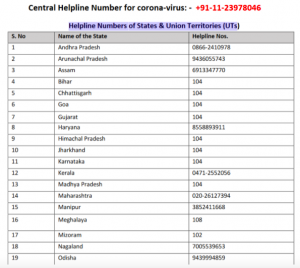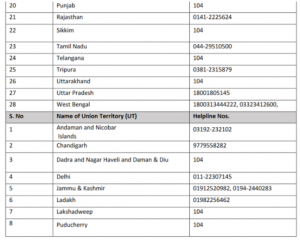If someone is sharing fake news, there are several punishments they may face depending on the nature of the crime. For example, making up and sharing fake news on Covid-19 through Whatsapp can result in a person being punished under the law. Some other punishable offences are:
| Publishing or circulating any statement, rumour or report which may cause fear or alarm to the public. |
Section 505(1) of the Indian Penal Code, 1860 |
The punishment is jail time of up to 3 years and/or a fine. |
| False alarm regarding a disaster |
Section 54 of the Disaster Management Act, 2005 |
The punishment is jail time of up to 1 year or a fine. |
| Making a false claim for obtaining any relief, assistance, repair, reconstruction or other benefits consequent to disaster |
Section 52 of the Disaster Management Act, 2005 |
The punishment is jail time of up to 2 years and a fine. |
| Forwarding fake news |
Section 54 of the Disaster Management Act, 2005 |
The punishment is jail time of up to 1 year or a fine. |
Although there are many sources of false information on Covid-19, the most reliable sources of information are the following sources:
Information available in a State government’s website is also an authentic source of information. For example, Delhi’s Department of Health website.
Trigger Warning: The following content contains information on drugs and narcotics which some readers may find disturbing.
It is illegal to produce, possess, transport, import, export, sell, purchase, use and omit to warehouse poppy straw. The punishment for carrying out any of these activities is proportional to the quantity of Poppy Straw involved and not the type of activity.
- Small quantity (1 kg) – jail time up to 1 year and/or fine up to Rs 10,000
- 1 kg to 50 kg – jail time up to 10 years and fine up to Rs 1 lakh
- Commercial quantity (50 kg) – jail time between 10 and 20 years, and fine between Rs 1 lakh and 2 lakhs. The Court may also impose a fine of more than 2 lakhs.
Poppy Straw Concentrate
Poppy Straw Concentrate is derived from poppy straw. The punishments for activities around poppy straw concentrate vary from that of poppy straw.
- Small quantity (20 gm) – jail time up to 1 year and/or fine up to Rs 10,000
- 20 gm – 500 gm- jail time up to 10 years and fine up to Rs 1 lakh
- Commercial quantity (500 gm) – jail time between 10 and 20 years, and fine between Rs 1 lakh and 2 lakhs. The Court may also impose a fine of more than 2 lakhs.(( Section 15, Narcotic Drugs and Psychotropic Substances Act, 1985))
Force majeure(( Sections 32 and 56 of the Indian Contract Act, 1872)) clauses are contractual clauses which can change or excuse the parties’ obligations and/or liabilities under a contract when an extraordinary event or circumstance beyond their control prevents one or all of them from fulfilling those obligations. For example, if a construction company had to do work for a private company, they can use the force majeure clause in their contract from stopping the work in case of a disaster like an earthquake etc.
Depending on how the contract is drafted, such clauses may have a variety of consequences, including:
- Excusing the affected party from performing the contract partially or fully .
- Excusing that party from delay in performance.
- Allowing them to suspend or claim an extension of time for performance.
- Giving that party a right to terminate the contract.
Force majeure can include events for which no person can be held accountable. Some examples include Act of God or natural disasters, war or war-like situations, human actions such as armed conflict etc. For a force majeure clause to be invoked, the acts must be unforeseeable, external to the parties of the contract, and unavoidable. The law relating to Force Majeure is given under Sections 32 and 56 of the Indian Contract Act, 1872.
Covid-19 and Force Majure
Whether a contractual obligation can be avoided on the grounds of force majeure is a factual determination based on the specific terms of the contract. The courts will examine, in each case, whether the impact of the Covid-19 pandemic prevented the party from performing its contractual obligation. Indian courts(( Energy Watchdog v. Central Electricity Regulatory Commission (2017)14 SCC 80; Naihati Jute Mills Ltd. v. Hyaliram Jaganath AIR 1968 SC 522.)) have generally recognised this concept and have enforced it where appropriate.
Directions by Government of India
The Government of India has taken the following measures to prevent further disruption in international trade and commerce by declaring the outbreak of Covid-19 as a force majeure event.
- The Ministry of Finance issued an office memorandum dated February 19, 2020 which states that Force Majeure clauses can be invoked in Government contracts if there is a “disruption in supply chain due to spread of coronavirus in China or any other country”. The Memorandum further states that COVID-19 should be considered as a case of “natural calamity”. On May 13, 2020, the Ministry of Finance issued another memorandum stating that under contracts for construction/works, goods and services and PPP (Public-Private Partnership) with Government Agencies, parties can invoke the force majeure clause ‘after fulfilling due procedure‘ and ‘wherever applicable’.
- Ministry of New & Renewable Energy has issued an Office Memorandum dated March 20, 2020 which directs all Renewable Energy implementing agencies of the Ministry of New & Renewable Energy (MNRE) to treat delay on account of disruption of the supply chains due to spread of Covid-19 in China or any other country, as Force Majeure event.
Trigger Warning: The following content contains information on drugs and narcotics which some readers may find disturbing.
Methamphetamine is a psychotropic substance, the manufacture, possession, transport, import, export, sale, purchase and use of which is illegal in India.
The punishment for carrying out any of these activities is proportional to the quantity of Methamphetamine that you are caught with.
- Small quantity (2 gm) – Jail time up to 1 year and/or fine up to Rs 10,000
- 2 gm to 50 gm – Jail time up to 10 years and fine up to Rs 1 lakh
- Commercial quantity (50 gm) – Jail time between 10 and 20 years, and fine between Rs 1 lakh and 2 lakhs. The Court may also impose a fine of more than 2 lakhs.(( Section 22, Narcotic Drugs and Psychotropic Substances Act, 1985))
The government has launched helpline numbers and email addresses that one can approach in case of issues related to Covid-19 or for general information on the disease.
- National Helpline Number: +91-11-23978046 or 1075
- National Helpline Email ID: ncov2019@gov.in
- National Twitter Handle: @CovidNewsByMIB
- WHO WhatsApp Number: +41 798931892 (English)
For a list of helpline numbers specific to States, please see the table given below(( Coronavirus Helpline Number, Ministry of Health and Family Welfare, accessed at https://www.mohfw.gov.in/pdf/coronvavirushelplinenumber.pdf.))


Trigger Warning: The following content contains information on drugs and narcotics which some readers may find disturbing.
Morphine is a drug manufactured from opium. It is illegal to manufacture, possess, transport, inter-state import/export, sell, purchase and use Morphine without proper government licenses. The punishment for carrying out any of these activities is proportional to the quantity of Morphine involved and not the type of activity.
- Small quantity (5 gm) – jail time up to 1 year and/or fine up to Rs 10,000
- 5 gm to 250 gm – jail time up to 10 years and fine up to Rs 1 lakh
Commercial quantity (250 gm) – jail time between 10 and 20 years, and fine between Rs 1 lakh and 2 lakhs. The Court may also impose a fine of more than 2 lakhs.(( Section 21, Narcotic Drugs and Psychotropic Substances Act, 1985))
Trigger Warning: The following content contains information on drugs and narcotics which some readers may find disturbing.
Heroin is a derivative of opium, the chemical term for which is Diacetylmorphine, also known as dia-morphine.
It is illegal to manufacture, possess, transport, inter-state import/export, sell, purchase and use heroin. The punishment for carrying out any of these activities is proportional to the quantity of Heroin involved and not the type of activity.
- Small quantity (5 gm) – jail time up to 1 year and/or fine up to Rs 10,000
- 5 gm to 250 gm – jail time up to 10 years and fine up to Rs 1 lakh
Commercial quantity (250 gm) – jail time between 10 and 20 years, and fine between Rs 1 lakh and 2 lakhs. The Court may also impose a fine of more than 2 lakhs.(( Section 21, Narcotic Drugs and Psychotropic Substances Act, 1985.))
Trigger Warning: The following content contains information on drugs and narcotics which some readers may find disturbing.
Diazepam is a psychotropic substance(( Section 2 (xxiii), Narcotic Drugs and Psychotropic Substances Act, 1985; read also Schedule, Narcotic Drugs and Psychotropic Substances Act, 1985)), the manufacture, possession, transport, import, export, sale, purchase and use of which is illegal in India.
The punishment for carrying out any of these activities is proportional to the quantity of Diazepam that you are caught with.
- Small quantity (20 gm) – Jail time up to 1 year and/or fine up to Rs 10,000
- 20 gm to 500 gm – Jail time up to 10 years and fine up to Rs 1 lakh
- Commercial quantity (500 gm) – Jail time between 10 and 20 years, and fine between Rs 1 lakh and 2 lakhs. The Court may also impose a fine of more than 2 lakhs.(( Section 22, Narcotic Drugs and Psychotropic Substances Act, 1985))
Trigger Warning: The following content contains information on drugs and narcotics which some readers may find disturbing.
Thebaine is a manufactured drug derived from opium. It is illegal to manufacture, possess, transport, import, export, sell, purchase and use in India. The punishment for carrying out any of these activities is proportional to the quantity of Thebaine that you are caught with.
- Small quantity (2 gm) – Jail time up to 1 year and/or fine up to Rs 10,000
- 2 gm to 100 gm – Jail time up to 10 years and fine up to Rs 1 lakh
- Commercial quantity (100 gm) – Jail time between 10 and 20 years, and fine between Rs 1 lakh and 2 lakhs. The Court may also impose a fine of more than 2 lakhs.(( Section 21, Narcotic Drugs and Psychotropic Substances Act, 1985))
Trigger Warning: The following content contains information on drugs and narcotics which some readers may find disturbing.
Codeine is a manufactured drug derived from opium. It is illegal to manufacture, possess, transport, import, export, sell, purchase and use Codeine in India. The punishment for carrying out any of these activities is proportional to the quantity of Codeine that you are caught with.
- Small quantity (10 gm) – Jail time up to 1 year and/or fine up to Rs 10,000
- 10 gm to 1 kg- jail time up to 10 years and fine up to Rs 1 lakh
- Commercial quantity (1 kg) – Jail time between 10 and 20 years, and fine between Rs 1 lakh and 2 lakhs. The Court may also impose a fine of more than 2 lakhs.(( Section 21, Narcotic Drugs and Psychotropic Substances Act, 1985.))

